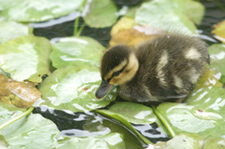 |
|
|||||||||
|
Webbed Footage
A Chicago biologist focused his lens—and his attention—on this summer’s Botany Pond duck family, hatching half a gigabyte of photos and a deeper appreciation for the quads’ small bit of wilderness. The mother mallard and her brood arrived at Botany Pond on June 10, likely beginning their march from a nest on nearby dry land the day the ducklings hatched. On June 11 Michael LaBarbera, professor in organismal biology & anatomy and the College, bought a high-end Nikon digital camera. A summer hobby was born. LaBarbera photographed the ducks every other day, sometimes for 20 minutes, sometimes an hour, chronicling the ducklings’ growth from “little balls of down” to confident adolescence. It wasn’t all sunny moments. Of the original ten ducklings, three—who didn’t feed themselves, as ducklings should, and soon looked “lethargic”—died in the first week. In early July another went missing, perhaps the victim of a raccoon or feral cat. The six others survived, growing and learning in the pond, where the lilies hid them from predators, the island afforded safe sleeping quarters, the ecosystem provided microscopic plants and animals to eat, and their mother taught them life skills—including caution with humans. Winning the mother over by tossing protein-rich birdseed instead of carbohydrate-heavy bread, LaBarbera says, “I swear she recognized me.” Seeing him and his camera equipment, she’d waddle over and quack expectantly. After the ducklings had grabbed the seeds at the water’s surface, she’d feed herself by diving for the ones that had sunk. Around August 20, leaving her ten-week-old children to fend for themselves, the mother disappeared. She headed for Lake Michigan, LaBarbera supposes, a greater food source to fatten her before the winter migration. The ducklings were not far behind. Labor Day weekend LaBarbera saw them, but by Tuesday they were gone, having fled their childhood home for life’s next stage.—A.B.
|
|
Contact
|

